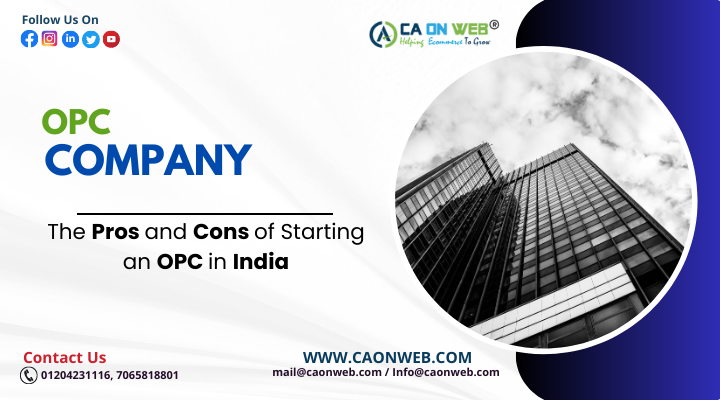The process of creating a Private Limited Company & One Person Company is the same. The Companies Act,2013 approval led to the creation of this kind of business. This type of business has gained popularity since it enables anyone to start a company without having to consider shareholders or subscribers. One-person company in India has a wide range of Pros and Cons along with OPC registration fees.
Overview of OPC Registration & incorporation
A person may establish a company under the Companies Act,2013 with just one member and one director. The director and the member can be the same people. As a result, an OPC company means that any single individual, a citizen, or an NRI can start a company that holds the benefits of a company with those of a sole proprietorship.
Mr. Sanket Agarwal has helped more than 100+ companies in the Company registration process. For the registration of one person company in India take his assistance. From India to Dubai, Hong-Kong he has helped many companies.
One person company in india is a specific kind of private limited company that can have only one shareholder for the duration of its existence. The company must first change its status from OPC to either a private limited or public limited company to add new members by issuing shares. The company likewise has all the advantages of a private limited company, with the exception that it’s not permitted to conduct banking or financial services business or to perform NBFC functions.
Pros of one person company registration
Compliance burden & Annual return filing
According to section 2(68) of the 2013 Companies Act, OPC registration is included in the definition of a “Private Limited Company.” An OPC will subsequently have to comply with procurement laws that apply to private limited corporations. The burden associated with compliance reduces for One Person Company because it receives many exceptions. The annual return for the One Person company must be signed by a director. OPC is exempt from the required requirement for the Company Secretary’s Signature.

Perpetual Succession
The permanent succession feature of a one-person company, an incorporated entity, will also help entrepreneurs raise financing for their companies more easily. A one-person company can only form by a natural person. OPC cannot form by an artificial person such as a corporation, LLP, partnership firm, etc. Hence, creditors must inform that they cannot leverage their claims against the company against the owner. The OPC and its members are seen as having different identities. As a result, the ember’s existence does not mark the end of the OPC. The member’s nominee, who was nominated by him, will oversee OPC operations in his absence.
Minimal Liability of Shareholders and Directors
Limited liability is one of the main advantages of incorporating a one-person business. The OPC members’ and shareholders’ liability is strictly capped to their respective shares. Business operations include both gains and losses. Hence, the business could occasionally suffer significant losses. A business owner must safeguard his assets in such circumstances. If a person owns the business solely, he or she will be personally responsible for its debts. In addition, the OPC sets restrictions on personal liability, so any losses or debts of a purely commercial origin will not affect an entrepreneur’s wealth or personal savings.
Bank loans are easy to obtain
Banks and other financial organizations make it simpler for businesses to get loans than unstructured forms of commerce. Most banks require business owners to register as corporations to acquire loans quickly.
Removal of unnecessary middlemen
The one-person company allowed sole proprietors to launch their businesses independently. Without introducing middlemen and splitting earnings with them, companies may thus directly connect with the target market and take advantage of additional services.
Flexible tax and savings methods:
The OPC has the authority to enter into a binding contract with its members. As a result, it can pay its directors compensation; lend them money, rent out its property, etc. Some of these costs, such as Directors’ compensation, rent, and interest, are permitted as deductions, which lower the company’s income and, in turn, lower its tax liability.

Annual or Extraordinary General Meetings are not necessary:
There are no requirements for an Annual general meeting or Extra Ordinary General Meetings. As OPC has only one member, it is not required to conduct an AGM or EGM. Communication of resolution by the member of the company, that shall be entered in the minute book, signed and dated by the member and such date shall be deemed to be the date of the meeting.
Conducting Board Meeting– Unlike many other forms of companies, the OPC may conduct just one Board meeting in each half of a calendar year. The gap between the two meetings shall not be less than 90 days.
Cons of one-person company registration
Members needed for OPC Registration
The first drawback of an OPC registration is the number of members; a one-person business registration can have a minimum or maximum of one member. It only permits one individual to be the sole owner and operator of the company. A minor cannot hold a share with a beneficial interest or join the OPC as a member or candidate.
Fit for small businesses:
Because the OPC is only appropriate for small enterprises, its suitability for small businesses plays a significant role in a company’s disadvantages. The maximum paid-up share capital or yearly revenue for OPC is therefore Rs. 50 lakh.
One-person operations:
The sole individual who has power over everything is the shareholder. On the off chance that he is perceptive, it is great; nonetheless, there are times when cross-checking is necessary for business development. The success and growth of the business will depend on one person’s decision-making skills.
Insufficient for high turnover:
The better option is to establish a private limited company rather than a one-person firm if you estimate that your business has a high turnover rate or if it has a high turnover rate. It’s not a smart idea to set up an OPC or, in some situations, to change a one-person company into a Private Limited company.
Ownership restrictions:
Rule 2.1 (1) of the Draft Rules under the Companies Act, 2013 states that One Person Company may only be incorporated by a natural person who is both an Indian citizen and an Indian resident.
As a result, the person incorporating the OPC must be a natural person, suggesting that it cannot be formed by a legal or artificial person, such as a company constituted following the Companies Act of 2013. This limits only individual ownership—not corporate ownership.
This clause also deters foreign direct investment by forbidding foreign and multinational corporations from setting up one-person subsidiaries in India. So, to attract investors, an OPC will need to convert to a private limited company under the law. Under the Automatic Approval route, where 100% FDI authorizes in the majority of sectors, foreign nationals, and NRIs allow to participate in a private limited company.
Conversion limitations
Under Section 8 of the Companies Act 2013 (Formation of companies with charitable aims etc.), an OPC cannot be incorporated.
Moreover, an OPC not allows engagement in non-banking financial investment operations. This involves purchasing securities issued by any type of entity corporate.
The following prerequisites must be satisfied before an OPC can change into a private or public company:
- The one-person company registration needs to have been operational for at least two years.
- It must possess a paid-up share capital that has grown to at least Rs. 50,00,000. (rupees fifty lahks).
- Its daily revenue must have been greater than Rs. 2,00,00,000/- (rupees two crores).

Details of OPC registration fees
The OPC registration fees include other expenses like filling out numerous forms, paying stamp duties that depend on the state where the OPC is being registered, receiving the DIN and DSC of the company’s directors, etc.
Also, it is usually advised to obtain the assistance of professionals while registering a company, whether it be an OPC or another kind of corporation. Consequently, paying a professional charge is a method to invest in getting the registration of the OPC, which is the first stage in forming the company, done correctly and cleanly. Once more, the professional charge that must be paid is based on the difficulty of the task at hand and a variety of additional factors.
For instance, one OPC could only need assistance to register the company on their own, whilst another OPC with a futuristic perspective might charge the duties of filing the accounts and GST in addition to company registration. The professional opc registration fees would vary in such cases. The registration fee often falls between Rs.7000 and Rs.30,000. Over 10 working days would pass before an OPC could be registered.
We at Caonweb can assist with work prioritization and simple one-person company registration. We at CA on Web are the leading online ca services in India. charging a nominal OPC registration fee.
Frequently Asked Question
Q.) Who are elegible to register a one person company in India?
Any individual who is a resident of India and has a valid PAN card can register an OPC.
Q.) What are the documents required for OPC registration?
The documents required for OPC registration include proof of identity and address of the director, proof of address of the registered office, and memorandum and articles of association.
Q.) Is it mandatory to include a nominee for an OPC?
Yes, it is mandatory to include a nominee for an OPC, who can take over the company if the sole director hinders or cannot run the company.
Q.) Is it possible to change an OPC into a private limited company?
Yes, an OPC can become a private limited company if its average yearly turnover exceeds Rs. 2 crores or its paid-up capital is more than Rs. 50 lakh.
Related Blog: What Are the Differences Between an OPC and a Private Limited Company?

Chartered Accountant by profession, CA Sakshi Agarwal has an experience of above11 years in Cross Border compliance , Import Export , International Taxation & is a passionate content creator.
